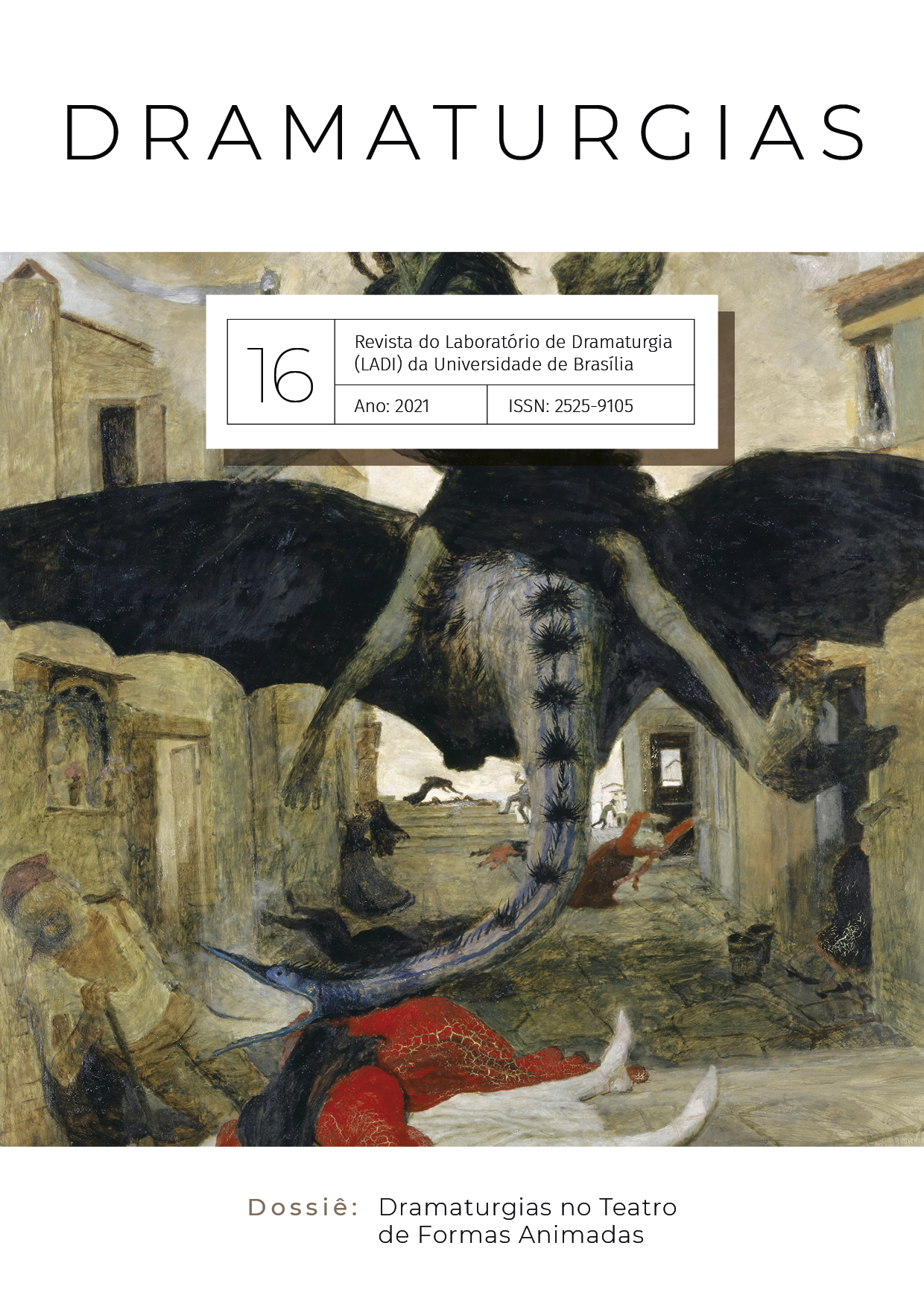Dramaturgy for the puppet theatre yesterday and today
DOI :
https://doi.org/10.26512/dramaturgias16.37472Mots-clés :
Aristotle, Melodrama, Parody, Total theatre, Adaptations.Résumé
Until the twentieth century notions of dramaturgy were closely bound up with the Poetics of Aristotle, often leaving out of account less ‘regular’ forms from Shakespeare to the melodrama. From the 17th to the 19th century live actors and puppets could be virtually interchangeable, performing the same or similar repertoires. Adaptation of plays from the actors’ theatre was the general rule. Comparatively few authors wrote directly for the puppet stage, and when they did it was usually under special circumstances. In the nineteenth century a juvenile market began to grow, Two main streams in European puppet theatre are: 1. puppets used in conjunction with story-telling and 2. puppets as substitutes for the live actor. The fact that the puppet is usually a small humanoid figure means that it has always been a valuable vehicle for parody and satire. The theatrical avant-garde that came onto existence in the late 19th century had an enormous impact on puppetry and the direct links between the puppet and the human began to disappear. Gordon Craig’s idea of the complete man of the theatre, which led to the modern one of the director, changed the whole concept of the puppeteer who ceased to be a mere operative becoming instead a creative artist in his or her own right. Increased exposure to other artistic forms, notably the visual arts, also resulted in an increasing divergence of puppetry from mainstream theatre and eventually the puppet theatre, instead of following the actors’ theatre, has come to be a leader in contemporary experimental and alternative theatre.
Téléchargements
Références
Eruli, Brunella (ed.) Puck 8 ‘Ecritures et Dramaturgies’ Charleville-Mézières, Institut international de la marionnette, 1995
Francis, Penny Puppetry, a reader in theatre practice, Basingstoke, Palgrave Macmillan, 2012.
Impe, Jean-Luc Opera baroque et marionettes, 1994.
Jurkowski, Henryk Ecrivains et marionnettes, Charleville-Mézières,, Institut International de la Marionnette, 1991.
Jurkowski, Henryk Métamorpohoses, Charleville-Mézières, Institut Internatinoal de la Marionnette, 2000.
Kantor, Tadeusz (ed. Denis Bablet) Le Théâtre de la Mort, Lausanne, L’Age d’Homme, 1977
Lee, Miles Puppet theatre and manipulation, North Vancouver, Charlemagne press, 1991.
McCormick, John with Cipolla, Alfonso and Napoli, Alessandro The Italian Puppet Theatre, a History, Jefferson, McFarland, 2010
McCormick, John with McCormick, Clodagh and Philips, John. The Victorian Maropnette Theatre, Iowa, University Press, 2004.
McCormick, John, with Pratasik, Bennie Popular Puppet Theatre in Europe 1800-
, Cambride, University Press, 1998.
Onofrio, J. Théâtre Lyonnais de Guignol. Reprinted 1909 by Lardanchet, Lyon, and by Lafittte Reprints, Marseile, 1978.
Posner, Dassia N., Orenstein, Claudia and Bell, John (eds.), The Routledge
Companion to puppetry and material performance, London and New York, Routledge, 2014.
Rubellin, Francoise Théâtre de la Foire: anthologie de pièces inédites, 1712-1736, 2005.
Speaight, George The History of the English Puppewt Theatre, Southern Illinois, University Press, 1990 (revised edition)
Téléchargements
Publié-e
Comment citer
Numéro
Rubrique
Licence

Cette œuvre est protégée sous licence Creative Commons Attribution - Partage dans les Mêmes Conditions 4.0 International.
Autores mantém os direitos autorais e concedem à revista o direito de primeira publicação, com o trabalho simultaneamente licenciado sob a Licença Creative Commons Attribution que permite o compartilhamento do trabalho com reconhecimento da autoria e publicação inicial nesta revista.



